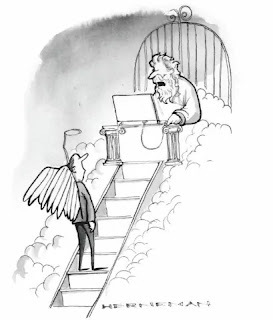How An Atheist Perceived Death and Made His Own Decision
Earlier this year an older friend, a philosopher, call him M, decided to end his life. He had been very ill for many months, and the prognosis was bad - only further decline and then death.
Worse perhaps, he had become depressed, could no longer concentrate enough to read, and had even stopped listening to jazz, which had been his lifelong passion.
For those who knew him, the idea of M, who read foreign novels in the original language for fun, and devoured philosophical essays and books, not reading or discussing philosophy or listening and talking about jazz was scarcely imaginable.
M had been a gentle, modest, sociable, generous, and witty friend and teacher to many - I can still hear him chuckling at a joke, his warmth when meeting, and his delight in describing a jazz track he loved or explaining a logical fallacy that he was writing about.
He valued his family life too he left behind a wife, a son, grandchildren. Yet in his final year he had lost so much of what made him "him," and he saw no serious upside in prolonging his deteriorating existence just for the sake of living M was an atheist, a humanist, a materialist (in the sense that he believed that we are sophisticated animals, with no immaterial souls capable of leaving the body after death), and was under no illusion that taking his own life would have consequences in some imagined afterlife.
Nor did he believe that simple existence, no matter how painful or empty of joy, was in itself valuable for its own sake.
He was well aware of and endorsed Epicurus's teaching that death itself is nothing to be feared and not something we experience anyway since when we are alive, it's not present; and when we are dead, we won't be there to experience it.
There is a beautiful passage in the work of the Venerable Bede, perhaps inspired by Anglo-Saxon poetry, in which he compares an individual's life to the swift flight of a sparrow through a banquet hall full of people who are gathered there at a feast. The bird flies in one door, along the length of the hall, and out at the other end.
Those within the hall have no idea what happened to the sparrow before it entered the hall and know nothing about what happened to it after it left.
Bede's analogy is meant to underline our ignorance about everything outside of our lived lives, and in particular, the uncertainty we have about what will occur after we die.
M, a great admirer of David Hume, believed that we should proportion our beliefs according to the available evidence and, like Hume, was extremely skeptical (to say the least) about the possibility of an afterlife.
For M, such a great weight of evidence pointed in the direction that death is more like a dreamless sleep (yet without a dreamer) than it is like a journey into a new realm, where people continue to exist in some disembodied form at some kind of never-ending party that is constantly being joined by new guests - as if there were another mead-hall the sparrow could fly in to, where all its needs would be met, and where it could flutter about happily for eternity.
There are different forms of ignorance: ignorance when we have no idea whatsoever about what is likely to happen, and ignorance that is simply lacking absolute certainty.
For M, a philosopher through and through, as for Hume, there would have been the outside possibility that there could be some form of life after death, just as there is no possibility that one day someone will find a pig with wings that can fly.
But for M, the likelihood of this was minuscule- so tiny that it would not even be worth staking a bet on this outcome even if the payoff would be huge in the highly unlikely circumstance of 'winning. In William James's terms, life after death was not a live option for M, just as it wasn't for Hume.
One way of measuring the strength of someone's belief on any topic is to observe what they actually do, rather than just listen to what they say about what they will do in such and such a circumstance.
It's one thing to endorse the view that an individual with a terminal illness should be free to end his or her life, and to seek assistance to do so if incapable of performing that final act; but it's something else entirely to follow through on this oneself, to perform as well as to endorse a philosophical position, particularly when this is irreversible, and will likely have profound consequences for others as well as for oneself.
 |
| "These days we just count up likes" |
M was a firm believer in individual freedom, and felt that people should be free to choose to and their own lives or be assisted to do so when they reasonably judged the future only held decline, suffering, and loss of control.
This is a freedom to decline to take that option too, of course: many people will always choose a combination of natural decline and palliative care over intervention that causes death directly.
M didn't want to be passive in the face of his terminal illness but also didn't want to put his family through the traumatic consequences of a potentially botched suicide attempt.
He lived in the UK and had to travel to Switzerland at great expense to find a reliable pharmaceutical method of suicide, one that he could be sure would be both painless and would result in a quick and easy death.
A man with a developed social conscience, he felt it deeply unfair that he, a relatively wealthy retired professor was able to afford this way out, while others less fortunate would have made a sane assessment of how the next months were likely to pan out for them, do the same, but could not afford to do what he was doing.
Suicide isn't illegal in the UK, but assisting someone to die can be. He didn't want to decline so much that he was unable to travel. He made his final journey and was able to end his life in the company of loved ones, after medical assessments, and with a reliable method of leaving life.
After avowing that this was the day he wanted to die, he took two drinks. First an anti-emetic, then the pharmaceutical equivalent of hemlock (appropriate perhaps for a philosopher) - followed by chocolate to take away the bitter taste.
He soon lost consciousness and died. We all should be allowed to make similar choices. For the terminally ill who believe life isn't sacred and can become so painful and impoverished for the individual that more of it would be worse than death, this should be an option.
It takes a kind of courage to choose this way out, one that we should admire rather than regret. Montaigne wrote an essay on the topic that to philosophize is to learn how to die. I would add that to philosophize is also to learn when to die.
British philosopher

